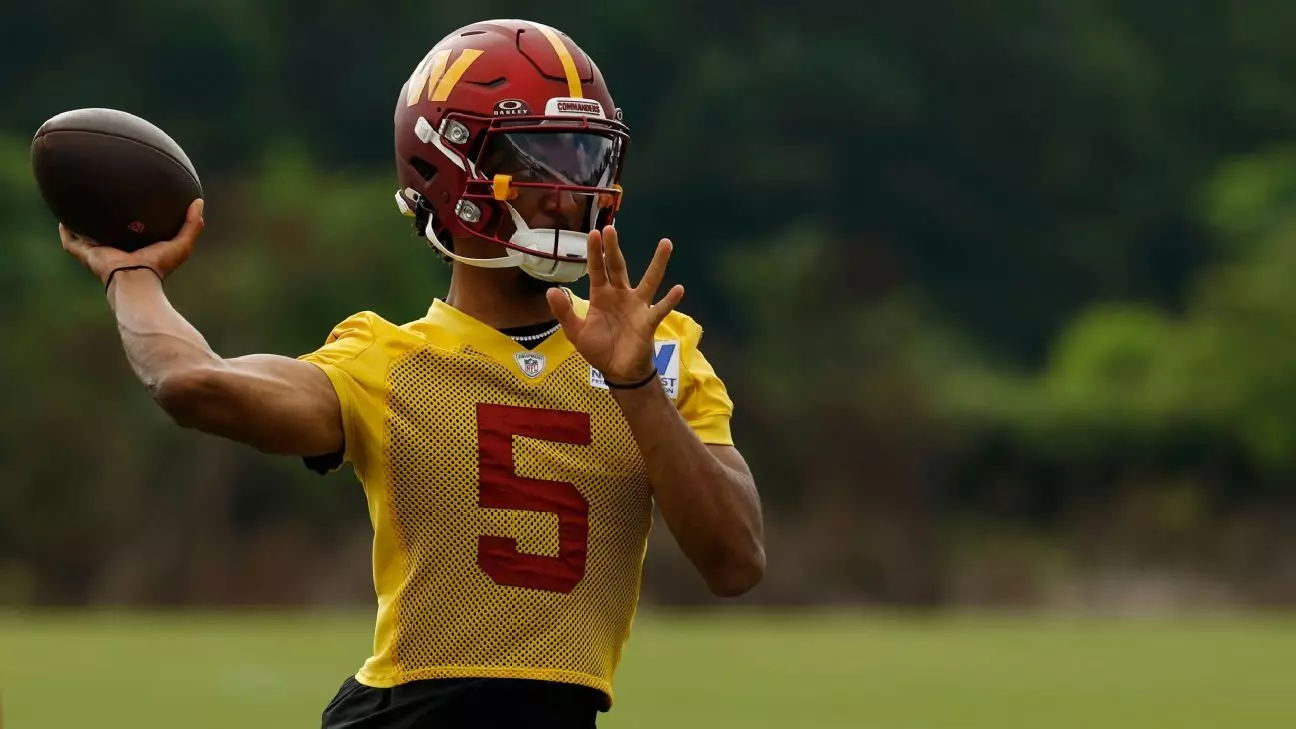In the ever-competitive landscape of the NFL, young quarterbacks often face a steep learning curve, balancing the demands of mastering complex playbooks while establishing leadership within their teams. Jayden Daniels, the rising star of the Washington Commanders, exemplifies a narrative of growth, resilience, and increasing confidence. His recent comments reflect not just technical improvement but a profound mental shift that propels him from a promising rookie into a commanding presence on the field. Where he once regarded gameplay as a cautious adaptation, Daniels now embodies a more assertive and authoritative figure, both in his comprehension of the offense and his influence in the locker room.
While Daniels’ rookie season was impressive—earning NFL Offensive Rookie of the Year honors—what truly sets his journey apart is his relentless desire to evolve beyond mere statistical performance. His acknowledgment that he is now “more used to the offense” is a testament to his dedication to becoming more than just a fresh-faced rookie; it signals a transition into a leader who understands his role as a cornerstone rather than an auxiliary contributor. This evolution is critical in the NFL’s competitive environment, where confidence and command often distinguish good players from great ones.
The Significance of Football IQ and System Mastery
One of the most intriguing aspects of Daniels’ progression lies in his burgeoning comprehension of Kliff Kingsbury’s offensive scheme. Football IQ isn’t usually spotlighted, yet it remains arguably the most crucial attribute for a quarterback aspiring to dominate at this level. Daniels’ statement that he now “understands what Kliff is calling” illustrates a maturation process—translating mere execution into strategic mastery. This understanding empowers him to access a richer “tool belt” of options, from identifying protections to selecting optimal runs against defenses.
The ability to process complex plays quickly is a hallmark of elite quarterbacks, and Daniels’ quick development in this realm speaks to both his natural aptitude and his work ethic. The fact that he can now adjust protections and run options based on looks he previously struggled to interpret ensures not only his personal growth but also enhances the entire team’s rhythm. It’s a reminder that NFL success is rarely confined to physical talent; mental acuity and preparation are equally vital.
From Rookie to Leader: A Cultural Shift
Perhaps the most compelling aspect of Daniels’ transformation is the emergence of leadership qualities. According to veteran running back Austin Ekeler, Daniels’ actions have become more authoritative—calling out mistakes and enforcing standards. The anecdote of Daniels removing a teammate from the huddle after a false start is a vivid indicator of his burgeoning leadership. Such moments demonstrate a player no longer content with passive participation; he recognizes that as the quarterback, he bears the responsibility to uphold team discipline and foster accountability.
This newfound assertiveness signals a cultural shift within the Commanders’ locker room. Head coach Dan Quinn’s comments reinforce this idea, noting that Daniels has already made significant strides from his first season. The confidence gained through experience has translated into a more fearless approach to leadership—one that demands excellence from himself and his teammates. This maturation process is often what elevates a franchise quarterback from a promising player to a franchise icon.
Reevaluating Expectations and Future Potential
Daniels’ development should challenge conventional narratives about second-year leaps in performance. While many players might still be adjusting, Daniels’ quick progression indicates not just familiarity but mastery of both the mental and physical elements of his role. His statistical performance last season—over 3,500 passing yards, 25 touchdowns, and additional rushing success—underscores that he was already operating at a high level. Now, with enhanced understanding and confidence, his ceiling appears even higher.
The narrative of a rising quarterback is incomplete without recognizing that mental toughness, leadership, and strategic comprehension are often more critical than raw athletic ability. Daniels’ example underscores the importance of patience and deliberate growth. As he continues to expand his leadership footprint, it’s reasonable to expect that his control of the game and influence within the team will only strengthen. The Commanders’ future hinges not just on the talent of their quarterback but on his capacity to evolve into a true leader who commands respect and inspires excellence.
In sum, Jayden Daniels exemplifies how a player’s internal development can redefine their impact on the field. It’s not merely about refining mechanics or accumulating stats; it’s about cultivating confidence, ownership, and authority—traits that turn good quarterbacks into franchise-changing leaders. His journey reminds us that the road to greatness is paved with continuous self-criticism, relentless adaptation, and an unwavering pursuit of excellence.

